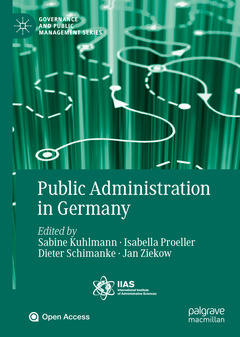Public Administration in Germany, 1st ed. 2021 Governance and Public Management Series
Coordonnateurs : Kuhlmann Sabine, Proeller Isabella, Schimanke Dieter, Ziekow Jan

This open access book presents a topical, comprehensive and differentiated analysis of Germany?s public administration and reforms. It provides an overview on key elements of German public administration at the federal, Länder and local levels of government as well as on current reform activities of the public sector. It examines the key institutional features of German public administration; the changing relationships between public administration, society and the private sector; the administrative reforms at different levels of the federal system and numerous sectors; and new challenges and modernization approaches like digitalization, Open Government and Better Regulation. Each chapter offers a combination of descriptive information and problem-oriented analysis, presenting key topical issues in Germany which are relevant to an international readership.
Date de parution : 01-2021
Ouvrage de 416 p.
14.8x21 cm
Thème de Public Administration in Germany :
Mots-clés :
Open Access; public administration; German public administration; federal administration; social security; Administrative federalism; institutions; reforms; governance; German administrative system; decentralisation; self-government; multilevel governance; Federal Constitutional Court; the German Constitution; the German federal architecture; European Union (EU); the Basic Law; the Federal Ministry of the Interior (BMI); the Länder



